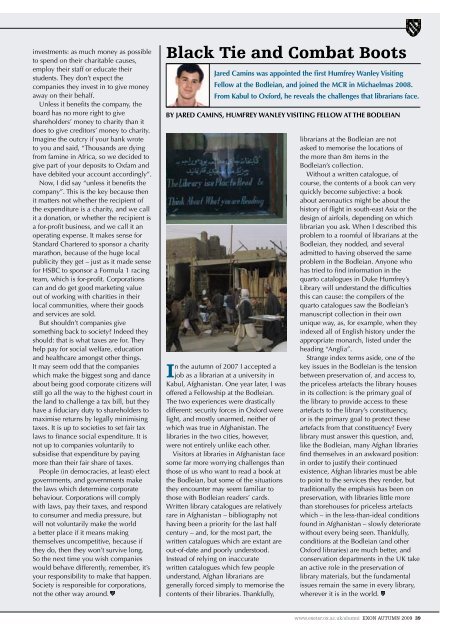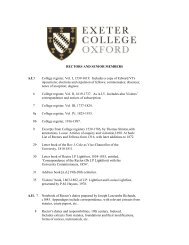Exon. - Exeter College - University of Oxford
Exon. - Exeter College - University of Oxford
Exon. - Exeter College - University of Oxford
Create successful ePaper yourself
Turn your PDF publications into a flip-book with our unique Google optimized e-Paper software.
investments: as much money as possible<br />
to spend on their charitable causes,<br />
employ their staff or educate their<br />
students. They don’t expect the<br />
companies they invest in to give money<br />
away on their behalf.<br />
Unless it benefits the company, the<br />
board has no more right to give<br />
shareholders’ money to charity than it<br />
does to give creditors’ money to charity.<br />
Imagine the outcry if your bank wrote<br />
to you and said, “Thousands are dying<br />
from famine in Africa, so we decided to<br />
give part <strong>of</strong> your deposits to Oxfam and<br />
have debited your account accordingly”.<br />
Now, I did say “unless it benefits the<br />
company”. This is the key because then<br />
it matters not whether the recipient <strong>of</strong><br />
the expenditure is a charity, and we call<br />
it a donation, or whether the recipient is<br />
a for-pr<strong>of</strong>it business, and we call it an<br />
operating expense. It makes sense for<br />
Standard Chartered to sponsor a charity<br />
marathon, because <strong>of</strong> the huge local<br />
publicity they get – just as it made sense<br />
for HSBC to sponsor a Formula 1 racing<br />
team, which is for-pr<strong>of</strong>it. Corporations<br />
can and do get good marketing value<br />
out <strong>of</strong> working with charities in their<br />
local communities, where their goods<br />
and services are sold.<br />
But shouldn’t companies give<br />
something back to society Indeed they<br />
should: that is what taxes are for. They<br />
help pay for social welfare, education<br />
and healthcare amongst other things.<br />
It may seem odd that the companies<br />
which make the biggest song and dance<br />
about being good corporate citizens will<br />
still go all the way to the highest court in<br />
the land to challenge a tax bill, but they<br />
have a fiduciary duty to shareholders to<br />
maximise returns by legally minimising<br />
taxes. It is up to societies to set fair tax<br />
laws to finance social expenditure. It is<br />
not up to companies voluntarily to<br />
subsidise that expenditure by paying<br />
more than their fair share <strong>of</strong> taxes.<br />
People (in democracies, at least) elect<br />
governments, and governments make<br />
the laws which determine corporate<br />
behaviour. Corporations will comply<br />
with laws, pay their taxes, and respond<br />
to consumer and media pressure, but<br />
will not voluntarily make the world<br />
a better place if it means making<br />
themselves uncompetitive, because if<br />
they do, then they won’t survive long.<br />
So the next time you wish companies<br />
would behave differently, remember, it’s<br />
your responsibility to make that happen.<br />
Society is responsible for corporations,<br />
not the other way around.<br />
Black Tie and Combat Boots<br />
Jared Camins was appointed the first Humfrey Wanley Visiting<br />
Fellow at the Bodleian, and joined the MCR in Michaelmas 2008.<br />
From Kabul to <strong>Oxford</strong>, he reveals the challenges that librarians face.<br />
By Jared Camins, Humfrey wanley Visiting Fellow at the Bodleian<br />
In the autumn <strong>of</strong> 2007 I accepted a<br />
job as a librarian at a university in<br />
Kabul, Afghanistan. One year later, I was<br />
<strong>of</strong>fered a Fellowship at the Bodleian.<br />
The two experiences were drastically<br />
different: security forces in <strong>Oxford</strong> were<br />
light, and mostly unarmed, neither <strong>of</strong><br />
which was true in Afghanistan. The<br />
libraries in the two cities, however,<br />
were not entirely unlike each other.<br />
Visitors at libraries in Afghanistan face<br />
some far more worrying challenges than<br />
those <strong>of</strong> us who want to read a book at<br />
the Bodleian, but some <strong>of</strong> the situations<br />
they encounter may seem familiar to<br />
those with Bodleian readers’ cards.<br />
Written library catalogues are relatively<br />
rare in Afghanistan – bibliography not<br />
having been a priority for the last half<br />
century – and, for the most part, the<br />
written catalogues which are extant are<br />
out-<strong>of</strong>-date and poorly understood.<br />
Instead <strong>of</strong> relying on inaccurate<br />
written catalogues which few people<br />
understand, Afghan librarians are<br />
generally forced simply to memorise the<br />
contents <strong>of</strong> their libraries. Thankfully,<br />
librarians at the Bodleian are not<br />
asked to memorise the locations <strong>of</strong><br />
the more than 8m items in the<br />
Bodleian’s collection.<br />
Without a written catalogue, <strong>of</strong><br />
course, the contents <strong>of</strong> a book can very<br />
quickly become subjective: a book<br />
about aeronautics might be about the<br />
history <strong>of</strong> flight in south-east Asia or the<br />
design <strong>of</strong> airfoils, depending on which<br />
librarian you ask. When I described this<br />
problem to a roomful <strong>of</strong> librarians at the<br />
Bodleian, they nodded, and several<br />
admitted to having observed the same<br />
problem in the Bodleian. Anyone who<br />
has tried to find information in the<br />
quarto catalogues in Duke Humfrey’s<br />
Library will understand the difficulties<br />
this can cause: the compilers <strong>of</strong> the<br />
quarto catalogues saw the Bodleian’s<br />
manuscript collection in their own<br />
unique way, as, for example, when they<br />
indexed all <strong>of</strong> English history under the<br />
appropriate monarch, listed under the<br />
heading “Anglia”.<br />
Strange index terms aside, one <strong>of</strong> the<br />
key issues in the Bodleian is the tension<br />
between preservation <strong>of</strong>, and access to,<br />
the priceless artefacts the library houses<br />
in its collection: is the primary goal <strong>of</strong><br />
the library to provide access to these<br />
artefacts to the library’s constituency,<br />
or is the primary goal to protect these<br />
artefacts from that constituency Every<br />
library must answer this question, and,<br />
like the Bodleian, many Afghan libraries<br />
find themselves in an awkward position:<br />
in order to justify their continued<br />
existence, Afghan libraries must be able<br />
to point to the services they render, but<br />
traditionally the emphasis has been on<br />
preservation, with libraries little more<br />
than storehouses for priceless artefacts<br />
which – in the less-than-ideal conditions<br />
found in Afghanistan – slowly deteriorate<br />
without every being seen. Thankfully,<br />
conditions at the Bodleian (and other<br />
<strong>Oxford</strong> libraries) are much better, and<br />
conservation departments in the UK take<br />
an active role in the preservation <strong>of</strong><br />
library materials, but the fundamental<br />
issues remain the same in every library,<br />
wherever it is in the world.<br />
www.exeter.ox.ac.uk/alumni EXON Autumn 2009 39

















